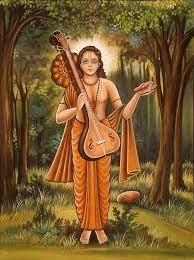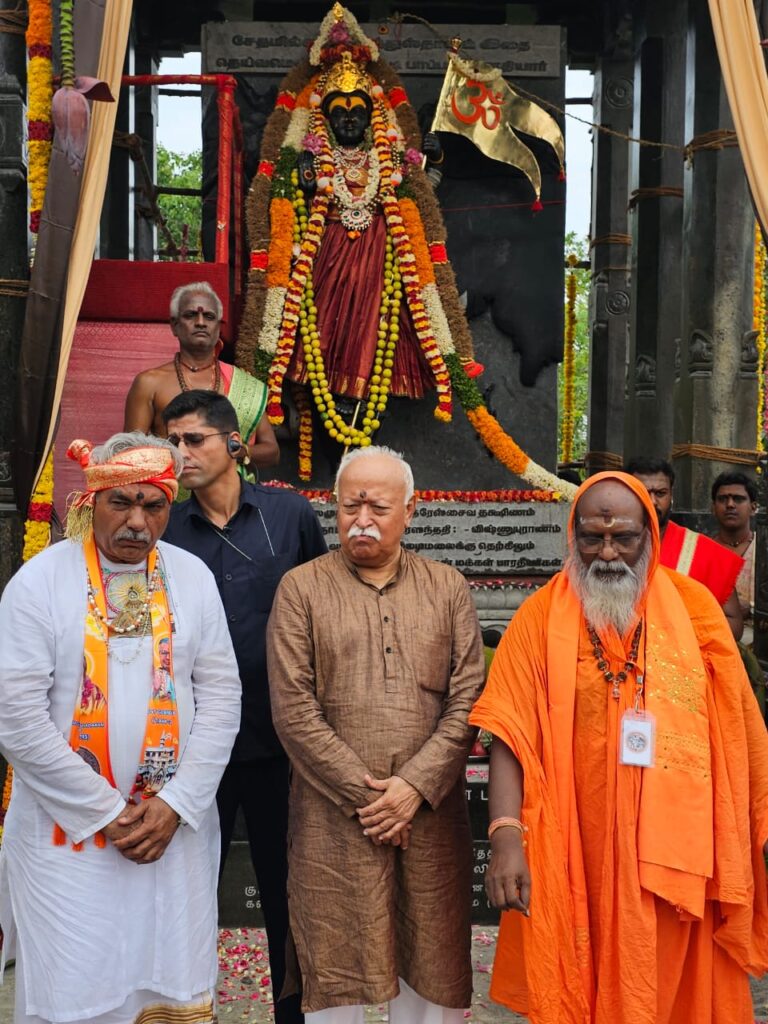
All mythology sage Narada presented in an essential role. They went termed devarisi, but their work was not confined to the Gods. They are present as friend, mentor, adviser and teacher of demons and humans. Philosopher who provide thorough knowledge about God is said to Narada. In Mahabharatha, Bhishma told Yudhisthira that Narada as ideal personality. Krishna told Ugrasen that are exemplary characteristics of Narada.
Narada was presented as Bhagwat reporter. It is also accepted that Valmiki the inspiration of Narada had composed the entire devotional poems such as epic and diameter of the Bhagavad Gita, Ramayana. Narada display great personality in many ways. Come in its incompleteness attention in the music he has also proven to be a musician to a high degree of rigorous austerity and practice. He learned music Agandhaharvoan and Narada composed Code book. Narada unlike other saints has no ashram.
Devarishi Narad, is one of the prajapatis and also among the seven honorable Rishis, having references from primordial times. He is a Supreme devotee of Narayana, who is considered as an embodiment of the truth. Birth of Narad has multiple history – Vishnu Purana says, he is the son of Sage Kashyapa whereas others say, he appeared from the forehead of God Brahma. This article views Narad, from the perspective of Dakshin Bharat and how he is celebrated there. Narada Jayanthi is observed on Pratipada Tithi during Krishna Paksha of Vaishaka month.
The fact that Narad, pioneer of communication science, is always identified with Veena, symbolizing the primary importance of music among all forms of communication. The devotion for Narad in Dakshin Bharat is expressed through music and his divine presence in temples. Music and devotion for God is breatheline for the people, which is deep rooted in the culture of Bharat.
Significance of Narad in Venkatesa Suprabhatham
The Legacy of ancient Bharat is unknown by time, high by value, which is still articulated in the form of music and devotion in Daskhin Bharat. One such is awakening of Maha Vishnu through Venkatesa Suprabatham in every household.
Each morning on the sacred Tirumala hills, God Venkateswra temple, opens with Suprabhatha seva at 3 am, bu reciting Sri Venkateswara Suprabhatham, in chorus, to wake up the holy God. It says, Devarishi Narad is also present to awaken Vishnu by his melodious songs.
Dating back to 1430 AD, Sri Venkatesa Suprabhatham written by Pratvada Bhayankara Sri Anantacharya, Acharya of Kanchipuram, consists of four parts with 70 slokas. Suprabhatham means ‘Auspicious morning’ the divine process of waking up the holy God everyday, begins with the recitation of first 29 Slokas. Sthotram means an ‘Entreaty’ and the next 11 verses are recited to praise the glory of God Venkateswara requesting Him to offer us protection from all the evil forces of this inhuman world. Prapatthi has 16 verses, which is recited by the devotees offering their complete surrender to His holy Lotus feet. Mangalaa Saasanam has 14 Slokas that are recited in praise of His noble qualities of glory and auspiciousness.
Such a divine Suprabhatham sung everyday in every household of Dakshin Bharatiya mentions about Narad’s presence in the ninth sloka.
Tantric prakarsa madhura svanaya vipancya
Gayatyananta caritam tava narado upi
Bhasa samagra masat krtacharu ramyaam
Seshadri sekhara vibho tava suprabhatham
Which means, with his melodious musical instrument veena, Sage Narada is singing your endless stories set to music and dancing to the enchanting music with lovely hand gestures, Lord of Seshachala, may this morning be beautiful. Such is the magnetism of Narad, in day to day spiritual communication of Dakshin Bharat.
Narada as Guruswamy of Thiyagabrahmam in the Carnatic musical world.
Music is seen as intimately connecting element to the inner soul. It is said that, every human carries within himself, the divine latent energy ‘Kundalini’, which lies unawakened. One of the yogic methods to awaken the dormant force is through Nadopasana or devotion through music. The treatise on science of Nadopasana is found in Bharat Muni’s Natya Shastra. When the western world is celebrating A R Rehman beats, the deep rooted Bharatiya run and come to offer their respect to Shri Thiyagaraja, the father of Carnatic music in Dakshin Bharat, who is one of the supreme example for ‘Living through devotion for music’. Rishi Narad who is believed to have blessed Thiyagaraja with his treatise on Sangeetha Shastra, accredited Narad as Guruswamy. The person for whom, Music is his religion says, Narad appeared before him and played his Veena called Mahathi.
The divine time remembering Narad Is, when Carnatic music lovers sing Sri Narad Muni composed by Thiyagaraja. Born in 1759, in Thiruvarur, Thanjavur District of Tamilnadu, to Kakarla Ramabrahmam and his wife Seethamma, the boy was named after God Thiyagaraja, the presiding deity of Thiruvarur. Thiyagaraja jhighly referred as one of the ‘trinity’ of Carnatic Music composers, along with Muthuswami Dikshitar and Syama Sastri. Thiyagaraja said, God realization is best achieved through Nadopasana, that is music with devotion. He had the highest reverence for Prahlada, Dhruva, Hanuman and Narada. He had composed about 24000 Carnatic sons. His songs are filled with an intimate devotion to Rama, all through revealing his deep understanding of the tenets of the Vedas and Upanishads. Thiyagaraja is said to have had a glance of Sage Narada through his immense devotion. Sage Narada is supposed to have had gifted the musical treatise ‘Swararnavam’. Thiyagaraja’s krithis ‘Sri Narada’ and ‘Vara Narada’ express his gratitude to the Great Sge.
Thiyagaraja experienced the love of God all the way through music. As the legend says that, he was blessed by the divine Sage Narada with great musical knowledge. Thiyagaraja dedicated his life to music and devotion for God. Acoording to him, both are combined, it is the best way to understand Supreme Brahman. He had sung Sri Narada Muni, a song in praise of Narada, on this juncture.
Thiyagaraja was a Nadopasaka, a votary of Nadopasana, who practiced music as worship. For him, Narada is seen as both the ideal, role model and the guru of gurus. He was immersed in the music exaltation of God, to the extent that, Narada miraculously appeared before Thiyagaraja, first as an old man and then as himself. Narada bestowed to him, the eternal treatoses on music, like ‘Swararnava’ and the book ‘Naradiya’. This facilitated Thiyagaraja to understand the higher intricacies of music and so, Thiayagaraja says, that his inner most wish was fulfilled in meeting Narada.
Since Narada enables Thiyagaraja’s Nadopasana or music as worhip, and Thiyagaraja prays to him in this context, this song is also considered an example of Nadopasana.
It is amazing to understand the friendship of Narad as told by Thiyagaraja.
Ninda Stuti
In Hinduism alone, bhakti has been expressed as character of shringara or erotic love. An online Carnatic radio station notes that, ‘these compositions are seen as passionate outbursts of the devotee, who takes liberties with the God because of the special relationship between them. Even though the lyrics appear to criticize the deity, the sons are an expression of affection, with the composer treating the deity addressed as an equal”, emphasis mine.
Whether it is, Suprabhatham, Carnatic music or Ninda stuti, Narada is felt, realized, given importance within the seven notes and seen as inseparable in the lifeline of Dakshin Bharat.

